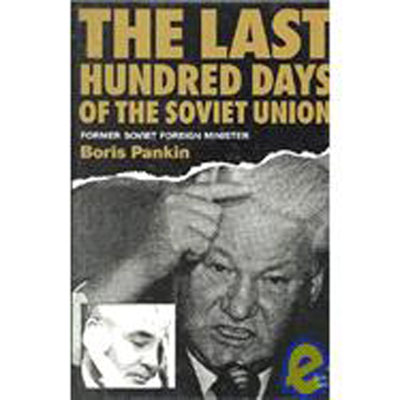born 20 February
1931, he was Foreign Minister
of the Soviet Union
for a brief
period in 1991. A
reformer and
journalist, Pankin had only 100 days to serve as Foreign Minister
before the
Soviet Union's collapse in 1991. In that short period, he established
diplomatic relations with the State of Israel,
managed the collapse of the GDR,
began the Soviet-US disarmament process,
brought the Soviet Union
closer to the European
Union and purged the KGB from
the ranks of the Soviet Foreign Ministry.
Pankin is best
known for being the highest-ranking
diplomat to stand against the August putsch
which sought to bring down Mikael Gorbachev,
the last
Soviet leader and promulgator of Glasnost
and Perestroika.
Pankin was Soviet
Ambassador to Sweden
for eight years from 1982-1990. He was
brought-in to clean-up after the Soviet Union's reputation was
seriously
tarnished in the aftermath of a diplomatic scandal in which a Soviet Whiskey class
submarine became marooned in Swedish territorial
waters outside of Stockholm.
The incident became widely-known as "Whiskey on the Rocks." Pankin
became, and remains, very popular in Sweden,
and was the Soviet Union's
longest-serving Swedish envoy.
Pankin was the
last Soviet Ambassador to Czechoslovakia
(1990-1991). Pankin is credited with preventing the
Communist-Czechoslovak
government from interfering in the Velvet Revolution-
which
led to playwright and dissident Vaclav Havel's
rise to the
presidency. Pankin was later recalled to Moscow to become Gorbachev's
Foreign
Minister after standing against the putsch which attempted to topple
the
reform-minded Soviet leader.
After the
collapse of the Soviet Union,
Pankin was
named Russian Ambassador to the Court of St. James (UK), where he
served until
1994. He resigned in protest over Russia's invasion of Chechnya.
Pankin now lives
in Bromma borough
outside Stockholm,
Sweden and
works as a lecturer and writer. In January 2005 he was given the
"Stockholm Citizen of the Month Award" by the city government,
recognizing his dedication and loyalty to his adopted home - the city
of
Stockholm. Boris Pankin sits on the Board of Advisors of the Global Panel
Foundation.
Published:
October 19,
1991
Following
are excerpts from remarks today by Secretary of State James A. Baker 3d
and
Foreign Minister Boris D. Pankin of the Soviet Union on invitations to
a Middle
East peace conference :
MR. BAKER
An
American Secretary of State and a Soviet Foreign Minister are together
in Jerusalem
for the first time in history.
What's
more, the Soviet Union has today restored full relations with Israel
after a
break of 24 years.
But
I think that our joint presence here today represents something more.
Foreign
Minister Pankin and I are pleased to announce that President Bush and
President
Gorbachev are today inviting Israel, Arab states and Palestinians to
attend a
Middle East peace conference to be held beginning Oct. 30 in Madrid.
That
conference is to be followed by direct negotiations designed to achieve
real
peace.
We
have witnessed new beginnings in other parts of the world. The
negotiating
process that we are seeking to launch with this invitation holds the
hope of a
new era in the Middle East. The hope of an era marked by acceptance and
not by
rejection, the hope of an era marked by dialogue and not by violence,
the hope
of an era marked by cooperation and not by conflict, and the hope of an
era
marked by hope itself and not despair.
This
invitation offers the peoples in this region a pathway to ending an era
of
confrontation, and it offers a basis for a new future.
The
road to peace, and I think we both understand this exceedingly well,
will not
be simple. To the contrary, it will be extremely difficult, with many
problems,
many hitches and probably many interruptions along the way. Old
suspicions will
not disappear quickly. The gaps are real, and the gaps will not be
easily
overcome. So we have no illusions about the hard work that lies ahead.
But
we take encouragement from the issuance of these invitations, which is
the
product of work of the last eight months. As we have all along, we
intend to
take this one step at a time. And so if we receive positive responses
to this
invitation, we will be taking one more step forward toward achieving
the peace
and security that the peoples of the Middle East have so long been
denied. MR.
PANKIN
Ladies
and gentlemen, the Secretary of State James Baker has just informed you
of the
joint Soviet-American statement. Therefore I have no other papers to
read out
to you. I can only say that I fully share what has just been said by
Secretary
Baker. However, I'd like to add a few comments.
The
stage that we have now come to represents a very important turning
point for
the entire situation in the Middle East. We have come a long way, and
we have
come a long way together. We made an important contribution to the
convening of
this conference in our capacity as future co-chairmen of the
conference, just
as important contributions have been made by all the other sides in
their hard
and untiring efforts.
We
are convinced that history is now holding out an opportunity that we
must not
pass up. And I urge all the participants of the conference to take this
opportunity.
As has just been mentioned by Secretary Baker, we have restored full diplomatic relations with the State of Israel, and we signed a joint Soviet-Israeli statement together with my counterpart, Foreign Minister David Levy, to that effect.
Dimitrievich
Pankin

"The
broad range
of views which
surfaced
in the course of initial and,
so
far, indirect
discussions
does
not overshadow the common
feature
in the positions of
all the
parties - the desire to have a durable
and
just peace in the
Middle
East
and
to
solve the most difficult
problems
that have
turned
this region into the
global
powderkeg."
--Boris Dimitrievich Pankin